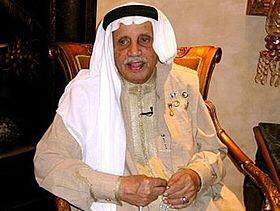
The godfather of the modern Saudi song
((Dean of the Saudi Modern Song)
Date of birth: 1919م
Date of death: 2012م
He was born in the suburb of Al-Muthanna, a suburb of Taif Governorate
He practiced agriculture with his father and sang the sweetest local songs behind the farmers
His father passed away when he was seven, and he moved to his uncle's house
He continued his life diligently and the struggle between school and work to provide life sustenance for his family
He was famous as a young man singing at the top of his voice while playing the sectarian sewer, which contributed to the formation of his early musical taste.
At the age of 14-15, he fell in love with the Oud instrument, when he saw it for the first time in the hands of artist Hassan Jawa at his concert in Taif.
Tariq Abdul Hakim joined the Saudi army, and graduated from lieutenant until he became a brigadier general in the artillery corps
Learn about Arabic music through his colleagues upon entering the military, listening to music records and memorizing songs.
The first Saudi on scholarship to study music, when the Minister of Defense Prince Mansour bin Abdulaziz Al Saud discovered his talent and nominated him to study music due to the need at the time to establish a private music and institute of music affiliated with the army
He graduated from the Institute of Music in Egypt with distinction in 1953
In the year 1375 AH, he was appointed artistic director of the Saudi Army Band, then he was promoted to Commander-in-Chief of the Army Orchestra
Approval was issued to appoint him as Director of Musicians of the Saudi Army in the year 1379 AH
He was tasked with distributing the Saudi national anthem using modern musical instruments, and teaching army music personnel
He developed national music starting with the military marsh, the national anthem, and the renewal and preservation of folklore
Transferring Saudi music from the stage of the aural melody to the stage of written musical notes on sound scientific foundations
He founded the musical band for the Saudi army, the Military Music Museum in Riyadh, the Institute of Music and Physical Education of the Public Security, the Arab Society for Arts, a museum bearing his name, and other institutes, associations and cultural groups.
He became a member of the Society of Composers and Authors in Paris.
He won the UNESCO Music Prize in 1981
He was awarded the Order of Merit for artists of the second degree during the reign of King Fahd - may God have mercy on him -
He was elected president of the Arab Music Society in 1983 and 1987
He performed tunes by major Arab artists such as Najah Salam, Faizah Ahmad, Warda, Talal Maddah, Muhammad Abdo, Hayam Younis and Samira Tawfiq.
His musical works were broadcast, either as melodies or songs, on the Voice of the Arabs radio station
He presented a group of his tunes, including the dawn of Egypt, to the late musician Abdel Wahab, and Abdel-Wahhab expressed his admiration for the dawn of Egypt
A group of Saudi songs played on Voice of the Arabs radio, such as
Hanna are men of war at the time of the fight
Special hymn to the voice of the Arabs
Jewel of the island music
Okaz Music
Tribal music
These works were recorded in the Egyptian Radio Orchestra, led by Attia Sharara.
Writings of Tariq Abdel Hakim:
He published the most famous popular folklore book, with its musical rules and theories
Musical instruments in the Kingdom of Saudi Arabia
Famous Arab musicians
A thousand military marchers and assigning them various names so as not to create confusion between the marchers
Marsh, monarch of the island
Marsh Al Saud
Marsh Al-Faisal
Cheetah Marsh
Marsh Al-Abdullah
Marsh the Sultan
Marsh Al-Nayef
Western Marsh
Northern Marsh
Eastern Marsh
Southern Marsh
Central region Marsh
Marsh Mecca
Marsh Medina
Jerusalem Marsh.
His most prominent works:
Oh Reem oh Wadi Thaqif
What is your identity
Hey free bath
Where are my beloved ones, Noor Al-Ain (Najat Al-Saghira)
Dawn of Egypt
My imagination in Cairo, the joys of Taif
Nawar Medina, Najd
Nights of Mecca
My heart attaches to an Arab girl. I cry for what happened to me, my family
God help us
Thank God, I got what we wish